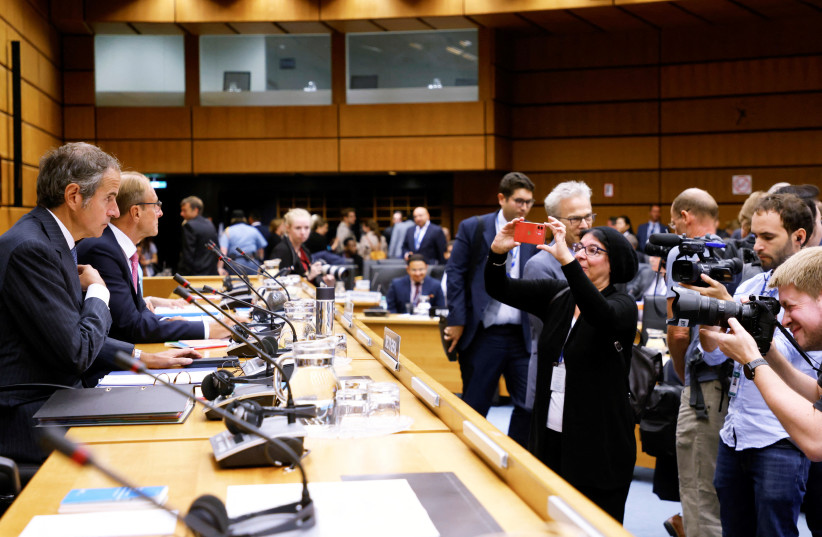IAEA chief: Iran has expanded stock of near-weapons grade uranium
IAEA Director-General Rafael Grossi warned on Monday that there is a “routinization” process underway of Iran’s many nuclear violations.
At a press conference after he addressed the IAEA Board of Governors, he also cautioned that any future deal between the Islamic Republic and the West must take into account the massive nuclear progress by Tehran from IR-1 centrifuges to IR 2, IR-4, and IR-6 centrifuges, as well as from 3.67% enriched uranium to 60% enriched uranium in large quantities.
While hoping for progress in negotiations with Iran and the West, he said he would continue to flag Iranian violations based solely on a scientific basis.
Earlier in the day, he told the IAEA Board of Governors that Iran has continued to increase its stock of 60% enriched uranium (close to weapons grade), and that there has been no progress in getting Tehran to credibly explain the existence of illicit traces of uranium found at undeclared nuclear sites.
In his comments regarding two reports which he submitted to the Board, Grossi said that even as the pace of enrichment by the Islamic Republic of uranium at the 60% level has slowed, it has still increased overall.

These developments came as somewhat of a surprise given the clear progress that has been made between the West and Iran in recent weeks toward unfreezing about $10 billion in Iranian assets, releasing five US citizens in Iranian prisons, and the noticeably reduced attacks by Iranian proxies against US forces in the Middle East.
“The [IAEA] Director-General [Rafael Grossi] regrets that there has been no progress in resolving the outstanding safeguards issues in this reporting period,” one of the reports said, referring to Iran’s failure to credibly explain the origin of uranium particles found at two undeclared sites.
This statement was received favorably by Israel, which was furious with the IAEA for closing two other investigations into Iran’s nuclear program in April and was concerned that the agency would soon close the remaining two probes as well.
The reports also stated that while there had been limited progress on reinstalling IAEA surveillance cameras in the previous quarter, there had been none since then, raising tensions further with the West.
The Islamic Republic and the IAEA announced an agreement in March on reinstalling surveillance cameras introduced under a deal with major powers in 2015, but which Iran unilaterally removed in 2022. Only a fraction of the cameras and other monitoring devices the IAEA wanted returned have actually been reinstalled.
Last November, Grossi said returning to the JCPOA 2015 nuclear deal would be very difficult in terms of assuring that Iran had not cheated or concealed illegal volumes of uranium given how long the ayatollahs have blinded about 27 IAEA cameras since early 2022 and that IAEA access to its own data had been restricted by Iran dating back to February 2021.
Adding to the issues that are likely to cause tension with the West, Iran’s stock of uranium enriched to up to 60% grew by an estimated 7.5 kilograms to 121.6 kg., the IAEA report said, even though 6.4 kg. of it was diluted with uranium enriched to a lower level.
Iran’s production of uranium enriched to up to 60% has slowed to around three kg. a month from about nine kg. a month previously.
Sources have said the slowdown could be part of so-called “de-escalation” efforts between Iran and the US also involving Iranian funds frozen abroad and US prisoners held in Iran, although US Secretary of State Antony Blinken has denied the issues are linked.
“Of course, Iran claims [the slowdown in enrichment to up to 60%] as a positive, but more HEU [highly enriched uranium] is still more HEU,” a Western diplomat said.
Ultimately, how to view Iran’s current enrichment efforts would depend both on whether one takes into account the dilution of 6.4 kg., which would bring down the total of new enriched uranium from 7.5 kg. to 1.1 kg., and on whether the goal for this period when no official return to the JCPOA has been declared was an Iranian freeze or a significant slowdown.
Slowing down just isn’t enough
From the Israeli perspective, even a slowdown is highly insufficient because it still leaves Iran with enough 60% enriched uranium to potentially develop three nuclear weapons, along with possibly another four or so from 20% medium-enriched uranium.
Under the JCPOA, Iran’s enriched uranium was to remain at 3.67%, even under the 5% level.
Even where IAEA monitoring equipment has been reinstalled, such as at a site in Isfahan, it does not have access to the footage that its cameras record.
One of Monday’s reports spelled out that problem.
“The Director General reiterates that for Agency cameras to be effective, including those installed at Esfahan, the Agency needs access to the data they record,” it said.
Put differently, as Grossi himself said multiple times in recent years, the IAEA has some recording devices, but it is actually blind about what is really happening in various key areas.
It was unclear when Iran would reinstall the rest of the IAEA cameras it has committed to, and it appears that it will not allow the IAEA access to all of the footage lost since 2021 before a full removal of sanctions and possibly even only if the two remaining probes are closed.
The IAEA, so far, has steadfastly refused to close the two remaining probes unless Iran explains the illicit sites and materials that it was caught with.
The two probes are based on Iran’s own nuclear secrets, which the Mossad seized in a daring operation in 2018.
Reuters contributed to this report.





Comments are closed.